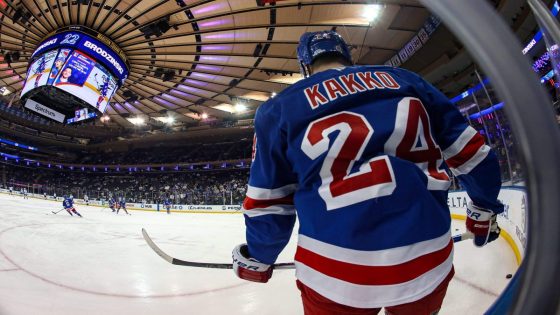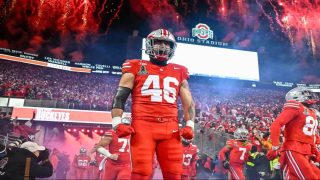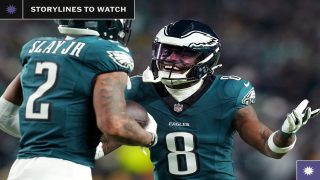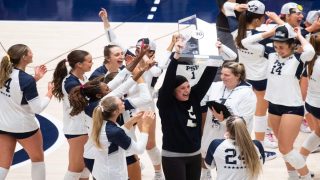Chatter around Kaapo Kakko’s name is spreading throughout the league. His healthy scratch against the St. Louis Blues will only lead to more.
Though his level of play — like many of the New York Rangers’ players — has dipped during New York’s recent stretch, Kakko has had a solid start to 2024-25. He has 14 points in 29 games and plays a responsible two-way game. He has a plus-10 rating, though some of his underlying metrics suggest that could regress. Still, the 23-year-old has been far from New York’s biggest issue this season, and he’d have value to other teams.
The question is how much. The Rangers selected Kakko No. 2 in 2019. He has given New York 329 games, second to only Jack Hughes in his draft class, but has not been the superstar a club hopes to acquire whenever it has the No. 2 pick. Kakko’s best season was 2022-23 when he had 18 goals and 40 points.
Five of the top 16 picks from the 2019 draft are not on the team that originally selected them. Some of their trade returns could give insight into what general manager Chris Drury could expect if he is able to complete a Kakko deal.
• Chicago traded Kirby Dach, the No. 3 pick, to Montreal in 2022 for the No. 13 and No. 66 picks in the 2022 draft. Dach had shown less in the NHL at the time of the deal than Kakko has now, but it was also more than two years ago. Montreal was trading for Dach based on his potential. Drury getting that much of a return is a long shot.
• Colorado traded Bowen Byram, the No. 4 pick, at the 2024 trade deadline for Casey Mittelstadt, a pending restricted free agent. Byram’s upside trumps Kakko’s. New York would not be able to get back a top-six center with team control in a trade.
• St. Louis signed Philip Broberg, the No. 8 pick by Edmonton, to an offer sheet. The Oilers let him walk and received a second-round pick as compensation. Broberg has played much less than Kakko at the NHL level but had a solid showing in Edmonton’s run to the Stanley Cup Final. The Blues bet on him having more to his game. Perhaps another team will do the same with Kakko.
• Vancouver traded Vasily Podkolzin, the No. 10 pick, to Edmonton for a fourth-round pick. He had 35 points in 137 games at the time of the trade, so the Rangers can expect significantly more than that if they move Kakko.
• The Canadiens made another similar trade to the Dach one in 2023, acquiring Alex Newhook, the No. 16 pick. Newhook was coming off back-to-back 30-plus point seasons and was part of Colorado’s Stanley Cup-winning club, and he fetched the Avalanche a late first-round pick and a second-round pick that they flipped for Ross Colton.
So what can Drury expect? A second-round pick? Maybe a package of a later pick plus a pending unrestricted free agent? Perhaps one team values Kakko enough to make a bigger offer, but that’s no guarantee at this point. There’s also no guarantee the return for Kakko will be greater in the present than what he’s contributing. He’s been one of the Rangers’ most consistent forwards.
That kicks off this week’s observations column, which includes the games against Chicago, Buffalo, Los Angeles and St. Louis. I have seven this week in honor of Rod Gilbert’s retired number.
1. Chris Kreider, the longest-tenured Rangers player, did not comment on captain Jacob Trouba’s departure Dec. 6, the day Drury traded him to Anaheim. He wanted to focus on that night’s game against Pittsburgh.
A week later, after a Rangers practice, Kreider reflected on the impact it had on the team.
“Incredibly hard,” he said. “Heart and soul of our team. Our leader, our captain for several years and did an unbelievable job. Really good teammate and really good friend and had a massive impact on our team, in our room, around the building, the organization but also in the community.
“He’s one of one,” Kreider continued. “Professionally it’s obviously difficult because of what he brings and personally it’s been hard. He’s a friend, a very, very good friend.”
When discussing the leadership void with Trouba gone, Kreider mentioned similarities between this trade and when the Rangers traded then-captain Ryan Callahan to Tampa Bay in 2014. New players have to take on more of a leadership role, even if they weren’t wearing a letter.
There are obvious differences, though. The 2014 trade brought back Martin St. Louis, a Hall of Fame player who led the league in scoring a year before. The Trouba trade yielded nothing that can help the floundering Rangers in the present. Depth defenseman Urho Vaakanainen was part of the return, but he’s out with an upper-body injury. New York is 2-4-0 since the trade and got trounced 5-1 by the Los Angeles Kings, the only playoff team it has played.
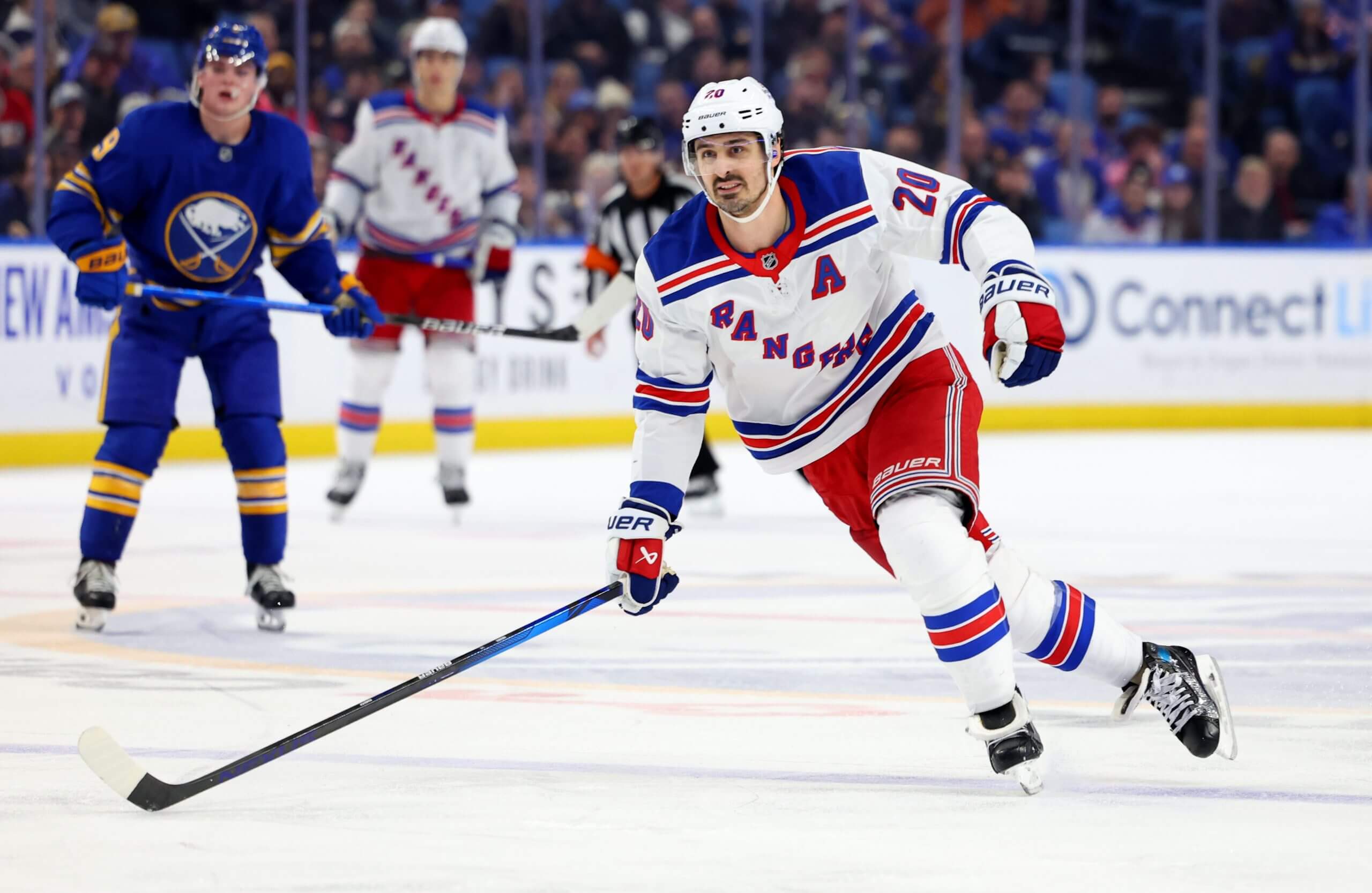
During his introductory press conference with the Ducks, Trouba said the Rangers threatened to put him on waivers if he did not accept a trade to Anaheim, which was on his no-trade list. New York used waivers over the summer to get Barclay Goodrow to San Jose, which was on his no-trade list. When asked if there was frustration in the Rangers dressing room on how the front office handled the Trouba situation, Kreider declined to comment.
“I don’t get paid for what I think,” he said. “I’m here to play hockey.”
2. Kreider had also yet to discuss making the Team USA 4 Nations Face-Off roster. He called his inclusion “incredibly exciting” but stressed he is not looking past the Rangers’ upcoming games.
NHL players haven’t competed in the Olympics since 2014, and the 33-year-old Kreider — who remembers watching the 2010 Canada-U.S. final while in college — has never played in a best-on-best international tournament. He thinks this one will be good for the sport of hockey; players enjoy representing their country.
“When the time comes, I’ll do whatever it takes to help them win hockey games,” he said.
3. Colleague Aaron Portzline, who covers the Columbus Blue Jackets, previously reported former Rangers captain Jacob Trouba did not waive the no-trade clause in his contract to facilitate a trade to Columbus. Portzline asked Trouba why, and the defenseman said, “Multiple teams (were involved) and things were evolving fluidly. I just felt that Anaheim was a good fit for me. Thought there could be a future there with my wife and what she does.”
Trouba said there were no red flags with Columbus.
“It wasn’t like I had my pick of the litter,” Trouba told Portzline. “It’s just kind of how things unfolded. The Anaheim thing came up and that was the direction we decided to go.”
4. Rangers fans are growing more and more vocal with their displeasure. There were boos after the Chicago game, as well as boos at the end of each period against Los Angeles. One can imagine what the crowd would have been like if the Blues game had been in New York.
“Deservedly so,” coach Peter Laviolette said after the Chicago game. “When your pace should be at a higher level and execution should be at a higher level, I get it. It’s frustration.”
5. The Rangers had an awful game defensively against the Kings, allowing five goals in the first 25:04. Asked if the Kings scouted anything specific that they could exploit, forward Alex Turcotte said, “I don’t think too much. We knew they had some younger D, but they’re all really good players.”
Indeed, the young defensemen struggled. In the 7:52 the Zac Jones–Victor Mancini pair was on the ice at five-on-five, the Kings led 9-4 in shot attempts, 5-1 in scoring chances and had 83.33 percent of the expected goal share, according to Natural Stat Trick. And if analytics aren’t your thing, the actual results backed those numbers up: The Kings led 3-0 in goals during those minutes.
Laviolette scratched Mancini against St. Louis, going with Chad Ruhwedel in his spot.
6. Where would this team be without Will Cuylle? He scored again against St. Louis and is up to 11 goals and 23 points. He had 13 goals all of last season and should blow past that total soon.
Still, Laviolette opted not to go with Cuylle with Jonathan Quick pulled against the Blues, instead going with a six-man unit of Adam Fox, Alexis Lafrenière, Filip Chytil, Vincent Trocheck, Mika Zibanejad and Kreider. This came after the coach relegated Kreider to the fourth line and slashed Zibanejad’s ice time dramatically.
7. Zac Jones has had to shoulder more responsibility against tougher opponents since the Trouba trade and K’Andre Miller’s injury. He averaged 16:12 a night before the trade and is up to 17:37 in six games since. The results during that stretch have not been ideal. He has gotten caught too low in the offensive zone multiple times with dangerous opponents on the ice. He has no points the past six games and a minus-4 rating. The 24-year-old still generates good offensive chances — he showed that against St. Louis — but certainly had more success in a more sheltered role.
Jones is far from the only issue on defense. Fox hasn’t been a Norris-level player. Miller struggled to start the year and now is hurt. Trouba is gone and Mancini is still developing. Ryan Lindgren made another brutal mistake against St. Louis. All of it has led to someone like Jones playing a bigger role than he’s likely suited for. It’s all symptomatic of a team that lacks depth on the back end.
(Top photo of Kaapo Kakko: Danny Wild / Imagn Images)
